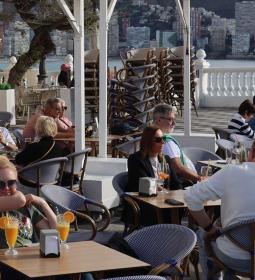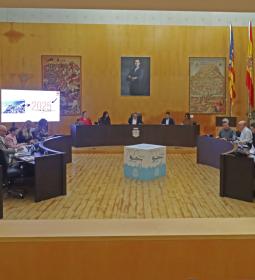The entity has weighed up the services, infrastructures and projects promoted to improve the care of senior residents and tourists
Benidorm becomes the first destination to certify its commitment to the elderly with the help of AENOR

Benidorm is committed to maintaining and increasing the measures that have awarded it this recognition
Last year Benidorm was recognised as the most accessible destination in Spain at the International Tourism Fair (Fitur) in Madrid, and in 2025 the city will become the first destination to certify its commitment to the elderly by AENOR. A certificate that was announced this Thursday on the second day of the fair, at an event held in the Central Plaza of the Comunitat Valenciana stand and in which the mayor, Toni Pérez; the president of the Generalitat, Carlos Mazón; and Nicolás Henríquez, director of Business Development at AENOR, participated. Toni Pérez has assured that “with this certification, we take another step in our commitment to social inclusion and quality of life, especially for a group such as our elderly, who have always been welcomed and cared for in Benidorm, a destination and a city that in recent years has promoted the implementation and deployment of services, infrastructures and projects to improve care for senior residents and tourists, as well as a tourism model that prioritizes the experience and well-being of all its visitors.”
The mayor has added that “with this certification, Benidorm intends to actively combat ageism, a phenomenon that marginalizes and excludes older people, and which, therefore, clashes head-on with our philosophy of an open and welcoming city and destination.” To combat this phenomenon, “we intend to ensure that the elderly group receives dignified and respectful treatment, encouraging their active participation in society and tourism, and making available to them the services that can contribute to increasing their quality of life standards.”
Toni Pérez stressed that “historically, Benidorm has been a refuge for the elderly, both tourists and residents, due to its accessible urban model, the services and also the climate”. Circumstances that have been reinforced by specific actions such as those assessed by AENOR when auditing the city favourably under the specification of Certification of Commitment to the Elderly.
In the presentation, the latest data from Eurostat were presented, which shows that the percentage of people over 65 years of age in the European population continues to increase and will reach 30% by 2050. Given this scenario, “Benidorm takes on the challenge of adapting to the needs of this important demographic segment, which currently represents more than 21% of the population at the European level and 24% in Spain”.
“We are talking about a senior population that is increasingly active and demanding and, therefore, it is a stimulating challenge to continue working to offer more and better public, tourist and experiential services aimed especially at this type of public,” he said. Likewise, the mayor recalled that “the average expenditure of senior tourists is 15% higher than that of other age groups” and that this fact, together with the fact that older travellers are those who have more time available to adapt their holidays to their interests and that they choose medium or low season periods to escape crowds, makes this population group “the key to the of tourist demand”.
“It is enough to look at the data to observe that 37% of people over 65 years of age say that they go on holiday more than twice a year; 30% have done so two or three times in the last twelve months, and 7%, more than four. These data reflect that many of them value and prioritise recreational, leisure and tourist activities and Benidorm cannot remain passive in the face of this”, Toni Pérez added.
From AENOR, Nicolás Henríquez has highlighted that “for the first time a destination is betting on such an important segment” as the senior, bringing “all its services closer to the elderly so that they are not left behind” with “commitments that are already a reality” and that accredit the inclusive nature of Benidorm. The head of the entity has emphasised that these services, operational all year round, also present “high-quality standards” as has been shown throughout the certification process, and has emphasised the “de-seasonalisation” potential of senior tourism. Finally, he is convinced that “as the first certified destination, Benidorm will be the flag to attract many more destinations”.
Finally, the President of the Generalitat has highlighted Benidorm's commitment to "sustainable tourism" which was the impetus for the certification of the Valencian Community as the first region with a tourism sustainability strategy certified by AENOR.
Mazón has pointed out that the city marked the way towards the current tourism model. He has also described Benidorm as a "pioneer of the happiness industry" because its evolution has allowed it to be the first certified smart tourist destination in the world and to be awarded the title of Green Pioneer 2025 by the European Commission thanks to balancing the influx of tourists with the preservation of the environment.
A certification that makes a difference
The AENOR certification, designed to highlight organisations that actively work on inclusion and quality care for the elderly, has among its key objectives to facilitate the understanding and use of services, helping the elderly in complex activities or products, guaranteeing their accessibility and ease of execution; reinforce trust, implementing messages and actions that strengthen the confidence of the elderly towards the services they use; or offer quality care, guaranteeing processes focused on the customer experience and providing added value in each interaction. It also pursues a commitment to sensitive sectors, such as banking or online, to demonstrate its commitment to digital inclusion and adapted care; and contributes to the 2030 Agenda by focusing on the Sustainable Development Goals related to social inclusion and equality.
To grant Benidorm the Certification of Commitment to the Elderly, AENOR has weighed up some of the actions the city has been developing for years in different areas to promote integration and full inclusion of this group. These include, for example, the offer of accessible beaches and beach libraries, operating at least 335 days a year, offering comfort and inclusion for the elderly; daily care of the environment, with water and sand analyses 32 weeks a year to guarantee the highest quality on our beaches; the health in motion project, maintenance of 23 bio-healthy areas to promote exercise and outdoor well-being for the senior community; along with other natural spaces designed for enjoyment, connection with nature and relaxation.
Other aspects and short-term commitments that have also been valued are the digital transformation for the elderly, with the imminent opening of a specialized care and training service office for access to digital tools, thinking exclusively of seniors; the commitment to sport without limits, promoting a 15% increase in sports activities adapted for the senior community, because age is never a barrier; the offer of social centres and other spaces to offer more and better services to our community of seniors; the ‘Brújula Project: connecting lives’, to detect and prevent social isolation with innovative initiatives and community projects; or the promotion of active ageing, with the commitment to increase activity sessions in social centres by 10%, supporting an active and full life.
Likewise, among Benidorm's commitments towards the senior group is its support for local commerce, setting up a citizen service office to facilitate access to consumer vouchers and promotions, promoting local commerce; senior digital communication, promoting content on social networks aimed at seniors and digitally disseminating activities designed for them; clear and useful information, through the publication of material and maps specially designed for senior visitors; or the implementation of more comfortable waiting areas, adapting the five administrative extensions, the tourist office and the Town Hall to offer more accessible and welcoming spaces.
Likewise, the City Council will continue to improve excellence in tourist care, creating an improvement group to optimize the senior experience in tourist establishments; as well as training in specialized care, training at least 30% of municipal and contract staff to improve care for the elderly, ensuring a quality service.
Access to culture for this group, enabling information on Benidorm Cultural in an easy-to-read format, promoting cultural accessibility and access for the elderly; or the so-called 'Literature without barriers', improving access to easy-to-read literary works in our libraries and promoting the cultural inclusion of the senior group, are other initiatives in the cultural field, which are also joined by other proposals to put technology at the service of the elderly, by promoting the use of ICT to improve health care and to combat the unwanted loneliness of the senior group; or urban adaptation to make Benidorm a more comfortable city for our elderly, with the implementation of ten new climate islands and shaded areas in public spaces and our parks and gardens.
In addition, the average spending of senior tourists is 15% higher than that of other age groups, according to recent studies, which highlights its economic importance for the tourism sector. In Spain, senior tourism has experienced notable growth in recent decades. The population over 65 years of age represents 19.6% of the total, and it is estimated that this segment will reach 15 million people in 2030. This growth is reflected in the increase in travellers over 65 years of age.
Older travellers have established themselves as the gateway to seasonally adjust the tourist demand since they are the ones who have the greatest availability of time to adapt their vacations to their interests, and above all they choose periods of medium or low season to escape crowds and higher prices.









